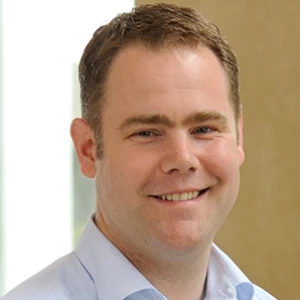Since 1990, the Foundation for the National Institutes of Health (FNIH) has been connecting scientists at the NIH with scientists in academia, industry, foundations, and nonprofit patient research organizations to solve health problems that require the talent and expertise of multiple organizations. Recently, the foundation’s CEO Julie Gerberding , MD, sat down with BCG’s Torben Danger to discuss leadership lessons, bold decisions, the Bespoke Gene Therapy Consortium, and health care’s greatest challenges. Edited excerpts of their conversation follow.
What is your key focus at FNIH?
Gerberding: We build bridges to breakthroughs. Our focus is team science, where we work with the incredible scientists at the NIH and connect them to their counterparts in the life sciences industry, academia, foundations, patient research organizations, and so on. We assemble the wise crowd of people who are working on hard problems that are important and problems that no single agency or institution could really solve on their own.
What are the three biggest leadership lessons you’ve learned from your experience in academia, industry, and the public sector?
Gerberding: First and foremost: plan horizontally but execute vertically. We take organizations that operate in a vertical sense and weld them together in a more horizontal sense to leverage the capabilities that many different people bring to the table. At the same time, we execute vertically so that we know who’s accountable, and we have the right people trying to get the right job done.
I used this approach when building the prevention epicenter at the CDC to study and prevent infectious diseases in patients and their health workers. Likewise at Merck, the goal was to knit research, manufacturing, and the commercial organizations together to further the globalization of our vaccine portfolio. And we’re doing this now at FNIH.
The second lesson is one all leaders know: build the best team you can. I certainly have had great teams at CDC and Merck, and I have a fantastic one at FNIH.
The third big lesson is to be transparent. Try to reveal what you’re thinking and go as fast as the organization can tolerate—and maybe a little bit faster. But make sure you’re clear about where you’re going and why.
What were the boldest decisions you’ve made to get to where you are now?
Gerberding: Two decisions stand out. The first was leaving the university in my cocoon of tenure to take a leave of absence and go to the CDC. Going to work for the government wasn’t an easy choice, but I knew I could go back after a few years and resume my faculty position, which was my intent. I didn’t expect to become the CDC director, but leaving the university felt bold because it broke a norm.
But my biggest and boldest decision was leaving public health for the pharma industry. Many of my colleagues and friends in the public health system were skeptical, but I had reasons for making this move. I knew that Merck had a good vaccine to prevent cancers associated with HPV infection, but that the vaccine was not available for the people who needed it the most in Sub-Saharan Africa and other resource-limited countries. When Ken Frazier, who was on track to be the CEO, asked me whether I would like to lead the effort to globalize this vaccine, it was a dream come true. I knew how lifesaving that kind of prevention could be for women and girls who suffer the most from cervical cancer and related HPV cancer. At the time, it felt scary to take that step, but it was the right decision.
You currently are leading the Bespoke Gene Therapy Consortium, a public-private partnership to provide access to treatment for rare diseases. What are the consortium’s objectives?
Gerberding: Rare diseases in isolation are rare by definition but in aggregate they’re common because there are so many different rare diseases, and an increasing number of them appear to be amenable to gene therapies or cell therapies. But the regulatory process for manufacturing the vectors and the cells needed for gene therapies is very challenging when you’re only studying the disease in just a few people, and you can’t do gold-standard, Phase III randomized clinical trials. This creates a lot of uncertainty among investors as to whether the gene therapy will ever cross the finish line.
The Bespoke Gene Therapy Consortium was designed to create a standard approach to the manufacturing of vectors. Creating a platform makes it a lot easier for the next company to manufacture the gene therapy it developed, without having to invent the wheel each time.
The same holds true for regulatory approvals. Once we have a predictable regulatory path for the approval of drugs for rare diseases, everyone benefits. Working with the whole consortium of 33 partners and the FDA, we published the first playbook on gene therapy that details the early lessons learned about manufacturing and regulatory approvals.
What are the biggest challenges you see for health care globally?
Gerberding: We have an aging population and one in which large numbers of people are transitioning from a subsistence economy to an affluent economy. The diseases of aging and affluence, like obesity, diabetes, cardiovascular disease, and cancer, are growing in prevalence. We are just not equipped to handle that transition very well.
In addition, we have climate change and its health consequences. We’re going to see massive population displacement, all kinds of stressors, air quality issues, respiratory conditions, and more. Unfortunately, some of the most affected places will be those that contribute the least to the climate change problem, but also have the least infrastructure and resilience to prepare for them.
Our health systems simply lack the resources needed to care for the aging population or the chronic disease population—then toss in a few emerging infectious diseases on top of that. Technology and biomedical advances should help us but will probably not be enough until we really deal with the broader social context in which wellness occurs.




